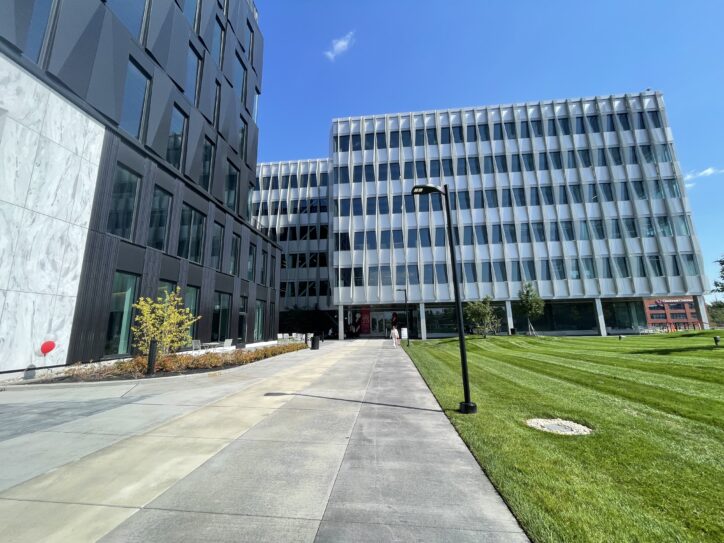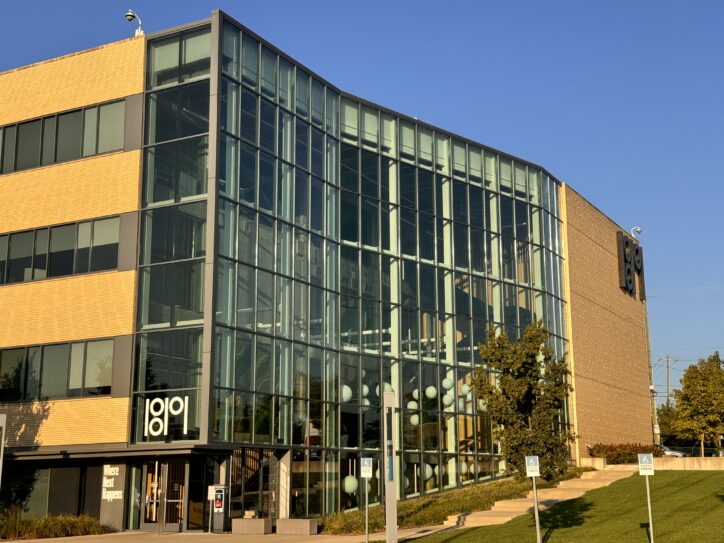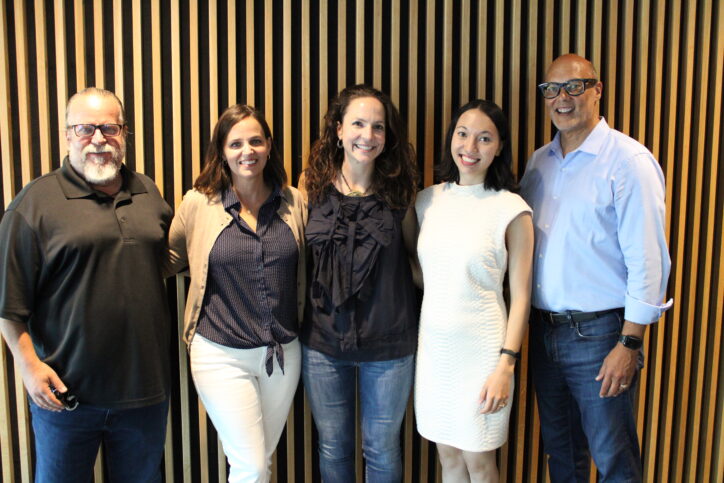In “The Silicon Heartland,” Cincinnati Champions Responsible A.I. Innovation
Since the invention of the computer, tech innovation in the U.S. has largely been monopolized by companies and institutions in coastal states, such as Microsoft and Apple on the West Coast, MIT in New England, and North Carolina’s Research Triangle.
As generative A.I. ushers in a new technological revolution, however, stakeholders in the Midwest and in Cincinnati, OH, specifically, are bucking the common wisdom among coastal tech’s ethos of moving fast and break things by intentionally positioning the region as a hub for responsible tech innovation. Public and private investments have enabled institutions like the University of Cincinnati to expand their research facilities and grow relationships with community partners to spur innovation holistically.
There’s also a growing grassroots movement of A.I. enthusiasts and entrepreneurs collaborating and empowering one another to capitalize on A.I.’s vast potential through A.I. education, experimentation, and entrepreneurism.
Let’s take a closer look at the many ways in which Cincinnati is a hub for Responsible A.I. innovation.

Ohio’s Innovation Districts
Made possible with more than $3 billion of public and private investments, Ohio’s Innovation Districts in Cincinnati, Columbus, and Cleveland serve as the bedrock of the state’s commitment to high-tech innovation. By integrating universities, businesses, and public institutions, these districts act as collaborative hubs where A.I.-driven research and development can thrive. The focus on Responsible A.I. within these districts is particularly important in ensuring that A.I. technologies developed are not only innovative but also ethical.
A key aspect of these districts is their ability to connect cutting-edge A.I. research with real-world applications. For example, healthcare, autonomous systems, and smart city initiatives all rely on A.I. technology. By embedding ethical principles — fairness and equity, privacy and security, robustness and accountability, sustainability, and transparency — within the DNA of these projects, Ohio’s Innovation Districts are pushing the envelope on creating A.I. solutions that respect human values. The districts aim to set a standard for responsible technological growth in a world where A.I. can easily be misused or become biased. Additionally, they foster environments where ethical concerns are not afterthoughts but core components of A.I. development.

University of Cincinnati
The University of Cincinnati (UC) is at the center of Cincinnatti’s rise as a Responsible A.I. hub. Through its various centers of innovation, community relationships, and leadership in A.I. research, UC is helping to shape the future of A.I. with a focus on ethical practices.

UC Digital Futures
A shining example of UC’s forward-thinking vision, the Digital Futures Building is home to multidisciplinary teams working on A.I. and other emerging technologies that address societal needs. Researchers there are tackling the problems of tomorrow such as figuring out how humans can safely work alongside robots and leveraging A.I. to make cities more livable. What makes this initiative unique is its intersection of technology with fields like law, ethics, and psychology — ensuring that A.I. systems are built with a deep understanding of their societal impact. It’s an environment where ethical A.I. isn’t a buzzword but a guiding principle shaping how projects are developed.
Through Digital Futures, UC actively engages with issues such as algorithmic fairness, transparency, and the impact of A.I. on marginalized communities. This kind of collaborative research helps develop A.I. systems that can be trusted, both by businesses and the public.

1819 Innovation Hub, the Center of the “Silicon Heartland”
The 1819 Innovation Hub is more than just a physical space — it’s a thriving ecosystem where startups, large enterprises, and researchers collaborate. The “Silicon Heartland” isn’t just marketing hype; it signals Cincinnati’s ambition to become a national leader in tech innovation. 1819 focuses on creating partnerships that are grounded in Responsible A.I. practices. Companies like Procter & Gamble and Kroger, which have ties to the hub, are increasingly exploring A.I.-driven solutions to streamline operations while maintaining ethical considerations such as reducing bias in data and improving consumer privacy.
This branding also ties into Ohio’s broader ambition to attract tech companies and top talent while ensuring that A.I. solutions are designed with human-centric values. The university’s programs often partner with these companies to develop A.I. applications for healthcare, logistics, and manufacturing — sectors where ethical A.I. can have a profound impact by ensuring decisions remain transparent and accountable.

Dr. Kelly Cohen
A leader in A.I. research, Dr. Kelly Cohen is focused on developing A.I. technologies for aerospace and autonomous systems, particularly in fields like unmanned aerial vehicles (UAVs). His work embodies Responsible A.I. principles by ensuring human oversight remains central to A.I. decision-making. In critical fields like aerospace, where lives are at stake, Dr. Cohen’s research ensures that A.I. systems are not only efficient but also trustworthy and accountable.
His contributions also extend into A.I.-driven solutions for industries like manufacturing and defense. Dr. Cohen has been a strong advocate for the integration of ethics in A.I. from the start, pushing for designs that minimize risks and increase human understanding of A.I. systems.

CincyAI Meetup for Humans
Co-hosted by Creativity Squared’s very own Helen Todd alongside Kendra Ramirez, the CincyAI Meetup for Humans (CincyAI) is the largest A.I. meetup in Ohio and in the tri-state region. CincyAI is a community-led initiative that brings together hundreds of A.I. enthusiasts and diverse stakeholders from the A.I. curious to users to builders to connect, learn, and collaborate together. The “for humans” part is a nod to the group’s emphasis on prioritizing human-centric A.I. development, ensuring that technology serves humanity rather than the other way around.
CincyAI meets monthly at UC Digital Futures. Subscribe to the CincyAI newsletter for more information about the group and upcoming events.

Cincinnati A.I. Catalyst
The Cincinnati A.I. Catalyst is a nonprofit initiative designed to accelerate A.I. innovation while ensuring it aligns with ethical principles. It serves as a platform where businesses, startups, and researchers can collaborate on A.I. projects that aim to solve real-world problems without compromising on responsible practices. The Catalyst encourages A.I. developers to prioritize ethical concerns, such as eliminating bias from machine learning models and ensuring data privacy is maintained throughout the A.I. lifecycle.
Through mentorship, funding, and access to resources, the Catalyst ensures that new A.I. solutions are held to high ethical standards. For example, startups focused on A.I.-driven healthcare or autonomous systems can gain access to experts in A.I. ethics and data governance to ensure their technologies adhere to Responsible A.I. guidelines. This initiative plays a critical role in developing Cincinnati’s reputation as a center for A.I. that is innovative and socially conscious.

Cincinnati A.I. Week
Cincinnatti’s A.I. Week is already a major event in Ohio’s tech calendar, drawing together thought leaders from across the state and beyond. A.I. weeks (Columbus also hosts its own A.I. week) are designed to stimulate discussions on the latest advancements in A.I., with a special focus at this year’s Cincinnatti A.I. Week on Responsible A.I.. By bringing together academic researchers, business leaders, and policymakers, A.I. Weeks serve as a platform for Ohio’s tech ecosystem to align on the future direction of A.I. development.
Workshops and panel discussions at these events often focus on tackling key ethical challenges such as the importance of transparency in A.I. decision-making, and how to design A.I. that respects individual rights. There is also a growing emphasis on educating the broader public about A.I.’s potential risks and benefits. A.I. Weeks offer a space for these critical conversations to take place, ensuring that Ohio remains at the forefront of not just A.I. development, but the responsible governance of A.I. technologies.

Training the A.I. Leaders of Today and Tomorrow
Beyond the billions of dollars invested in higher education and upskilling programs such as those hosted at the 1819 Innovation Hub, Ohio is also investing heavily to make sure that its youth are prepared to navigate an increasingly A.I.-dominated world.
Several initiatives are driving this effort. Ohio’s Department of Education is partnering with tech organizations and universities to create A.I. learning modules that introduce students to foundational concepts like machine learning, data science, and algorithm design. These programs also focus on developing critical thinking skills and ethical awareness.
Several school districts across the state have also begun piloting A.I.-focused courses through after-school programs, robotics clubs, and STEM initiatives. These programs often feature hands-on activities that engage students in real-world applications of A.I., such as using machine learning models in science experiments or developing simple algorithms for problem-solving tasks. By integrating A.I. education early on, Ohio aims to cultivate a generation of students who are not only proficient in technology but also capable of designing A.I. solutions that prioritize social good.
Institutions like UC are helping to bridge the gap between K-12 education and higher learning. Through mentorship programs and competitions like A.I. hackathons for high school students, Ohio wants to ensure that students have access to experts in A.I. who can guide them in responsible technology development. These early exposures to A.I. concepts—combined with an emphasis on ethical considerations—help prepare students to enter the workforce as informed and responsible technologists.
This forward-thinking approach ensures that Ohio is not just producing the next generation of A.I. developers but is nurturing a culture of Responsible A.I. from the ground up. By starting early, the state is laying a foundation for long-term leadership in ethical A.I. development, ensuring that future innovations remain aligned with societal values.
